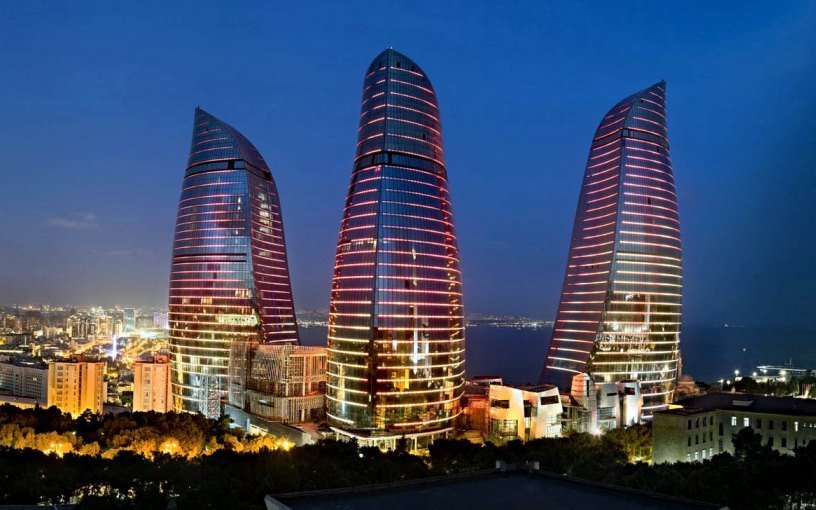(PONARS Eurasia Policy Memo) With the diminishing engagement of the United States in the South Caucasus[1] and the weak position of the EU as it deals with Brexit,[2] other world powers and major centers of gravity have begun to fill the vacuum. While traditional powers such as Russia use hard power to stay in the region, others have been exploring alternative ways to strengthen their local hand. China is one of the emerging powers that has been slowly increasing its influence in the region and is now beginning to play an important role.
China never reached the same level of intensity and cooperation with the region as it had with traditional partners such as the EU, the United States, Russia, or Southeast Asian states. Historically, relations between China and Armenia, Azerbaijan, and Georgia were positive, but none of the countries considered the partnerships to be longstanding or strategic. Geographical distance and the absence of massive Chinese investments meant that there was little to drive the relationship forward. However, China’s swelling interest in hydrocarbon resources, as well as the potential for transportation routes through Azerbaijan and Georgia to expand its trade (and influence), has led it to consistently penetrate the region with its huge economic resources. While other partners such as the United States and the EU have had ups and downs in relations with the South Caucasus, Chinese policy could be described perhaps best through the famous Abraham Lincoln quote: “I walk slowly, but I never walk backward.” For Azerbaijan, China today is the new superpower that can invest much-needed funds into infrastructure projects and can counterbalance the growing influence of Russia.
Multivalent Relations Calmly Commence
Diplomatic relations between the two countries was established back in 1992 and cooperation between them positively developed henceforth. China always supported and recognized the territorial integrity of Azerbaijan in relation to the Karabakh conflict. Such unconditional support to Azerbaijan comes from Beijing’s own stance in repudiating any secessionism. Having its own problem with breakaway-territory Taiwan, China has unanimously supported the Azerbaijan government in UN voting related to territorial integrity, and it has received reciprocal attitudes from Baku. Beijing was involved in only a few oil projects in Azerbaijan, mostly for representational purposes rather than economic benefits; it wanted a presence without massive immersion. Relations were good but neither side considered the other to be an essential partner.
China’s Belt and Road Initiative (BRI) project introduced in 2013 (and known until 2016 as One Belt, One Road) gave impetus to enhancing relations among the states along the new Silk Road. Azerbaijan reacted positively when China announced this ambitious program because Baku urgently needed players that could fill the vacuums left by an increasingly disengaged West. It hoped that land routes and high-speed rail links connecting East Asia and Europe would bring in Chinese funds and allow Azerbaijan to catch a share of the transportation benefits.
Starting in 2015, Beijing and Baku began to intensify their political relations. In December 2015, President Ilham Aliyev visited China, met with the country’s political establishment, and called for Chinese companies to invest in Azerbaijan. In 2016, the Asian Infrastructure Investment Bank, which was established by Chinese initiative, approved a loan of $600 million for the construction of a portion of the Trans Anatolian Natural Gas Pipeline Project (TANAP) that transports natural gas from fields in Azerbaijan through Turkey and onto markets in Southern Europe.
In April 2019, Aliyev went on a working visit to China to attend the second BRI international forum and met with the Chinese leader. A week later, the defense minister of Azerbaijan paid an official visit to China and the sides discussed further military cooperation, particularly Azerbaijan’s purchase of Chinese military equipment. The visit concluded with a document signed on mutual military aid and the purchase of Chinese arms.
Azerbaijan has bought Chinese arms before, including the Qasirga Т-300, a tactical weapon system used to support artillery units that releases indirect/blind shots against targets in all weather conditions. This weapon is actually produced in Turkey by Chinese license. Even the Polonez multiple launch rocket system that was purchased by Azerbaijan from Belarus was designed in cooperation with China. China has offered to sell Azerbaijan its main battle tank (the Type 99A2), a lightweight multirole fighter aircraft (the Chengdu J10), and the armored personnel carrier VP 10. Because Azerbaijan and Armenia are both under an OSCE arms embargo due to the Karabakh conflict, Baku has paid attention to other arms suppliers. Russian weapons do not give a competitive advantage to Azerbaijan vis-à-vis its archrival Armenia because Russia supplies the same or even superior weapons to Yerevan. At the same time, Baku eyes full-fledged cooperation with China in hopes it will help with resolving the Karabakh conflict peacefully, by, essentially, continuing to support the Azerbaijani cause at the United Nations.
Key Economic Aspects
In such a context, trade turnover between Azerbaijan and China shows positive dynamics.
During Aliyev’s visit to China, several agreements were signed. Based on these deals, for example, the China National Electric Engineering Company (CNEEC) will invest $300 million into a tire factory in Azerbaijan, an investment that promises to create 800 new jobs and boost the plant’s production potential to 3.3 million tires per year. Another multimillion dollar agreement would see investments into the agriculture sector. The signed package of agreements, in fact, increases the level of Chinese investments into Azerbaijan to the extent that the developments could be considered as a turning point in relations between the two states.
In 2018, imports from China increased by 40 percent and trade turnover reached $1.3 billion. Azerbaijan has become China’s number one trading partner in the South Caucasus compared to Armenia and Georgia. At the same time, Azerbaijan’s investments into China’s economy reached $1.7 billion, while China’s investments into Azerbaijan’s economy came close to $800 million. About 119 companies relying on Chinese capital are operating in Azerbaijan. Yet, China’s trade with the region is still far behind its trade with, for example, Kazakhstan at about $10 billion or Uzbekistan at about $6 billion (2018).
Baku’s political establishment enthusiastically greeted the Chinese BRI initiative, even though the public is largely unaware of many of the Chinese projects. Chinese investment helps to fill the funding gaps in Azerbaijan’s strategic development plan, allowing many projects to move forward that would otherwise have struggled.
In August 2015, the first container to use the BRI route travelled more than 4,000 km from China in a record six days to the newly constructed Baku International Sea Trade Port. This signaled a new era in regional transport links. It demonstrated to Chinese firms that cargo could reach Europe much faster via this BRI passage than by sea or through Russia. Both Kazakhstan and Azerbaijan pointed to these transportation aspects and developments to encourage Chinese companies to invest more in their territories. Azerbaijani authorities believe that by 2020 some 300,000–400,000 containers will be transported via the Azerbaijani route, bringing in billions of dollars in profit.
Both the Azerbaijani public and political establishment contend that China does not have a political agenda in the region due to its geographical distance. Chinese projects are therefore considered in purely economic terms. With falling oil prices and fewer cash reserves in the country, Chinese investments appear to be critical. Furthermore, China is perceived as a country that delivers and implements projects quickly. In contrast to the United States and the EU, both constrained by bureaucratic hurdles, and Russia, which puts geopolitics ahead of economics, China is considered to be a reliable and responsive partner.
Future Implications
Comparing China’s transnational connectivity program with Russian or EU integration projects, it seems clear, firstly, that China does not threaten the EU’s political stance toward the region as much as it might the Eurasian Economic Union’s (EEU’s). The Chinese initiative does not have the short-term agenda of exerting political and economic power/control over post-Soviet Eurasian states as does the EEU. In the long run, China’s program could provide tools for countries to get closer to Beijing for political and economic support. Currently, Azerbaijani-Russian relations are not burdened by any kind of negative issues or events, but despite Moscow’s push for Azerbaijan to join the EEU, Baku has been able to postpone that decision.
BRI could serve to strengthen ties between Asia and Europe. For instance, while China invests in BRI, the EU could invest in and revive the Transport Corridor Europe-Caucasus-Asia (TRACECA) project. The question that may arise is: which power, the EU or China, will have the greater influence along the route? While it would be difficult for the EU to compete with Chinese influence (especially after the establishment of the Asian Infrastructure Investment Bank), the South Caucasus leans toward, and on, European political influence. However, China’s involvements may very well greatly complement EU policy in the region. Chinese investments may not only help to develop other transportation routes but also help the region’s countries, especially Azerbaijan, to build up non-oil export potential. China could save money on the transportation costs of sending its products to Europe by exporting them from Azerbaijan. Europe would receive cheaper products from an Eastern Partnership country. And Azerbaijan would receive benefits such as the opening of new workplaces (employment) and new taxes, and its export potential status would improve.
Beijing’s ability to pump investment into Azerbaijan and help it stave off a potential financial crisis, with fast deliverables, makes China more attractive than various erstwhile Western investors. Still, the Chinese incursion should raise questions and prompt caution. Due to the low price of oil and the requirement for massive investment into the oil and gas sector, China’s role could become dominant, making it a critical power in the region once the oil contracts end and Western oil companies leave the country. It would force Azerbaijan to maintain a balanced policy toward China, to take into account Chinese interests as Baku manages its own strategic and national interests. Moreover, with its many lucrative industries and ports, Azerbaijan may face a “debt-trap diplomacy” issue with China whereby Beijing gives loans and expects repayment by (majority) shares or ownership of companies and industries. In recognition of this, Baku prefers to partner with China without committing to certain kinds of loans (such as “predatory loans”) that require state guarantees.
Chinese penetration into the region may also create zealous attitudes from traditional partners such as Turkey and Russia. Turkey considers the region as an area of its strategic interests, but nevertheless, it would not oppose investments from China. At the same time, even though Russia does not have friction with China, Moscow considers the South Caucasus in its sphere of influence. Baku is well aware of this situation and therefore cautiously builds relations with the “Eastern Giant” on the economic front while keeping cordial or neutral political relations with the other big powers involved in the region.
Anar Valiyev is Associate Professor at ADA University, Baku, Azerbaijan.
Note: Research work for this policy memo was funded by the UK Research and Innovation Councils (UKRI) under the Global Challenges
[PDF]
[1] See: Anar Valiyev, “U.S. Disengagement from the South Caucasus: The Throne Is Never Vacant,“ PONARS Eurasia Policy Memo No. 545, October 2018.
[2] See: Anar Valiyev, “Brexit and its Impact on Azerbaijan: Will East-West Integration be Harmed?,” PONARS Eurasia Policy Memo No. 461, February 2017.











